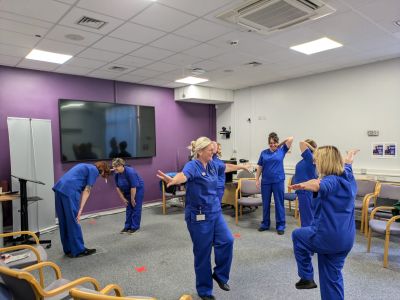Case Study: The Body Hotel SelfCare Suite
Authors(s), Creator(s) and Contributors: Dr Thania Acarón, Founder & Emma Edwards, Programme Manager, The Body Hotel CIC
Publication Date: 15/08/2025
Categories: Case Studies
Partner(s): Delivery Organisation: The Body Hotel CIC. Partners: Velindre NHS Trust, ACW; Evaluation: Wales School for Social Prescribing Research (WSSPR)
Funder(s): Arts Council Wales & Velindre NHS Trust
Introduction
The Body Hotel: Self-Care Suite was a movement for wellbeing programme designed and delivered in collaboration with Velindre NHS trust. It aimed to improve self-care and stress management for employees, but with particular focus on the teams of nurses and allied healthcare professionals working across palliative care within the Velindre NHS trust. The programme ran between January - June 2025, and featured several workshop formats, including Embodied Skills in Clinical Practice CPD workshops, wellbeing sessions during established staff meetings, Self-Care Saturdays intensive workshops, and movement interventions as part of conferences and professional development sessions. Evaluation was conducted by WSSPR, which included self-reported questionnaires and interviews with participants and managers. Findings indicate that participants experienced improvements in both personal and professional well-being, in terms of team building and navigating cultural workplace dynamics.
The Challenge
There is a higher rate of compassion fatigue amongst palliative care nurses, as “the prolonged contact with individuals during times that they are at end stages of serious illnesses predisposes palliative care nurses to physical, emotional, spiritual, and psychological distress, possibly limiting their ability to provide compassionate care” (Cross, 2019). The Body Hotel's approach to employee wellbeing is rooted on research which states that trauma is stored in the body and movement can offer an important source of support to liberate stored memories, help people process difficult emotions, which Rodrigues (2020) proposes can be supported through short interventions with staff. Previous project outcomes and evaluation identified that nursing staff were unable to access employee wellbeing support outside of their work hours due to the high demands and intensity of their work, and this indicated that we needed to embed our services within the sites.
The Approach
The Self-Care Suite used movement-based workshops to help palliative-care nurses and allied health professionals process grief, reduce burnout and embed quick, body-centred self-care into everyday NHS practice. A total of 16 sessions for NHS staff were delivered during regular working hours, involving 43 participants. In addition, seven 'Self-Care Saturday' sessions were run outside of working hours and open to individuals from other professions, and a new CPD pathway 'Embodied Practices in Therapeutic Settings' was developed, engaging a further 79 participants from both NHS and other health and wellbeing backgrounds (total of 122). Managers were expected to attend, reinforcing the idea that self-care is an integral part of the workday rather than an optional after-hours activity. Whole clinical and non-clinical teams (therapists, clinical-trials staff, psychologists, and others) attended together, enabling the workshops to tackle real workplace dynamics. Each session blended stress-release techniques with organisational-development activities, using a tailored menu of exercises for every team. The creative, movement-based approach aimed to place everyone, regardless of grade, uniform, or first language, on an equal footing. Evaluation findings confirmed the need for interventions to address cultural cohesion within the workplace. The CPD sessions took place across Velindre (staff offices and common spaces) and the Self-Care Saturday sessions were held at University of South Wales.
The Impact
The project’s evaluation was conducted by Dr Teresa Filipponi of the Wales School for Social Prescribing Research. Mixed methods were used to gather qualitative and quantitative research - online semi-structured interviews with participants and stakeholders, and analysis of the Neuroception of Psychological Safety Scale (NPSS) questionnaire which was filled out by participants before and after taking part in the sessions. The NPSS is a validated self-report questionnaire designed by The Polyvagal Institute (Kinsey Institute Traumatic Stress Research Consortium) to measure an individual's sense of psychological safety and belonging. It aims to assess how safe, connected, and physiologically at ease a person feels within a particular context, such as at work, at home, or in social settings. NPSS is one of the few validated measures to take into account body-based symptoms within wellbeing, and there is an ongoing need for more assessment tools to consider somatic aspects as a vital aspect of lived experiences. The data collected showed that the project resulted in positive changes in personal wellbeing through increased playfulness and vitality, improvements in emotional resilience and stress management, greater self-awareness in both mind and body and better connection between colleagues and team members. The evaluation was conducted amongst 11 participants of the project, and found that “average ‘social engagement’ scores – feeling accepted, heard and able to speak without fear of judgement – rose from 51 to 60 out of 65, a statistically significant improvement (p = 0.009).” (Fillipponi, 2025). View the full evaluation report via the links below. It was clear that in order for the benefits to continue, managers in the NHS would need to ‘buy in’ to the programme, enabling time and space for employees to continue the interventions. Future projects should include a plan for sustainability, ensuring that the benefits of movement are felt after the workshops end.
Lessons Learned
Whilst the movement sessions had clear, tangible benefits for the participants, data collection often disrupted the sessions. Participants reflected on practical constraints, such as workload, feelings of guilt about covering staff and scheduling constraints. In future, the data collection systems should be more streamlined and easily accessible, and managers should be encouraged to make scheduling arrangements so employees can take part without stress for themselves or others. An important finding was the benefit of the sessions in addressing cultural differences in the makeup of staff groups. Evaluation methods should be embedded further within sessions and more creative methods of evaluation can further enhance future projects.
The Legacy
The Body Hotel remains committed to providing movement sessions for employee wellbeing, and particularly for those working in healthcare - a profession that directly serves others. This project has reaffirmed that movement has great benefit for people of all walks of life, not only physically, but mentally and emotionally. The company continues to work across all health boards, and the self-care sessions open to the community make sure that spaces remain available to make movement-for-wellbeing accessible to everyone. We look forward to working with other health boards and organisations to meet their employees’ needs, reducing stress and boosting emotional resilience within a wide variety of workplaces and industries.
Website and Social Media Links
The Body Hotel Web & Social Media Links: https://linktr.ee/thebodyhotel Project Web Page: https://www.thebodyhotel.com/self-care-suite WSSPR Evaluation Report: Filipponi, T. and Wallace, C. (2025) The Body Hotel Self-Care Suite: Evaluation. Pontypridd: University of South Wales. Available at: https://pure.southwales.ac.uk/ws/portalfiles/portal/30988588/The_Body_Hotel_Self-Care_Suite_Evaluation_Report.pdf
Contact Details
Dr Thania Acarón Founder, The Body Hotel CIC thebodyhotel@gmail.com
Tags: staff wellbeing, palliative care, burnout prevention, self-care, NHS, dance, movement, somatic practices, embodied skills

